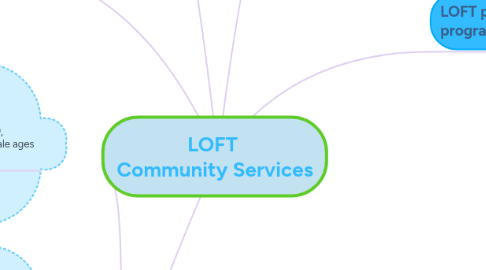LOFT Community Services
저자: Sonia-Kay McInerney


1. Visions and Goals
1.1. Serve those most in need with mental and physical challenges by offering housing and stability.
1.2. Promotes recovery and independence for people with complex challenges including mental health challenges that run the risk of homelessness.
1.3. Place for recovery and growth within a supportive community
1.4. Fills the gap from child to adult service sectors, and between hospital and community based services.
2. Equity and Inclusion
2.1. Welcome youth, adults and seniors of all gender identities and sexual orientation.
2.2. "LOFT clients become part of a community where they are accepted without judgment, where they are offered supports but their choices remain their own, and where their housing provides not only safety and security but also a sense of belonging."
2.3. "They assist at-risk youth in meeting the needs of all areas of their lives and help them get the medical, financial, emotional, employment and recreational supports they need to be healthier, happier and independent."
2.4. Welcomes all youth regardless of race, religion, ethnicity, creed, sexual orientation, gender identity and gender expression.
2.5. Committed to operating from an anti-oppressive framework, fostering an environment of equity and inclusion by acknowledging how diverse identities intersect to contribute to unique experiences of marginalization.
3. Services and Programs offered
3.1. Transitional Age Youth Program (TAY), specifically works with female and male ages youth 16-26
3.2. Offers support and case management for youth with mental health issues and youth addictions.
3.3. LOFT - Youth services offers a range of housing and supportive services 16-26 for male and females with mental health and addiction issues. Serving over 600 at risk youth a year.
3.3.1. High supportive housing for those with moderate to severe challenges, 24/7 on site staff.
3.3.2. Medium to low support housing .Youth live together and manage their homes cooperatively.
3.3.3. Community and weekend treatment program.
3.3.4. Campus Recovery Groups are open to students who feel that their substance use may be interfering with school, work, relationships or other areas of their lives.
4. Assessment
4.1. Each youth is linked to a case worker.
4.1.1. Case worker meets the youth in their preferred surroundings in their community.
4.1.1.1. They assist at-risk youth in meeting the needs of all areas of their lives and help them get the medical, financial, emotional, employment and recreational supports they need to be healthier, happier and independent.

